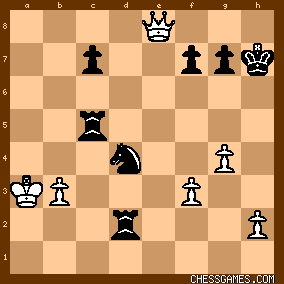Phony Benoni: <Final Positionafter 40.40.Qe8>
click for larger viewBlack found a unqiue way to lose this easily won position: he announced mate! The claim was incorrect, whether it was three moves (Chess Review) or "several moves" (Fort Worth Star Telegraph). There is no quick mate in the position, except possibly a "Stockfish Several" of 15-20 moves. This is a social faux pas, but there is no punishment prescribed under the Laws of Chess. The real problem was that this happened on the last move of the time control. When Stapp neglected to actually make a move, his flag felll and BUrge claimed a win on time forfeiture. Burdge then made what must have seemed a sporting offer by suggesting they call the game a draw. Stapp agreed, and the result was duly recorded as such ... for a while. This incident occurred in the first round of one of the preliminary sections at the 1940 US Open in Dallas, Texas. The top three finishers in this 10-player section would advance to the Championship Final. Herman Steiner took first place in the section. There were three contenders for the final two spots: Burde, Stapp, and Howard Ohman. The drawn result of this game stood until after the last round, when the final results showed Stapp with 6 point, Burdege and Ohm with 5 1/2. This meant that Stapp went to the Finals, while burdge and Ohman would contest a play-off game for the final spot. However, now tournament director Frank H McKee of Dallas ruled that the game would be counted a win for Burdge. This sent Burdge into the Final and Stapp into the play-off with with Ohman. The outcome of this was that Ohman went to the Final, and Stapp did not take his place in the Consolation Section. (It is possible that Stapp went home without even participating int he play-off; I have found no record of the game itself.) It's not clear why McKee changed the result. Perhaps, given the importance of the competitive situation, he felt an obligation to "make things right". (Note there was no local bias involved; McKee and Stapp were from Texas, Burge from New Jersey.) "Chess Review" states the result was altered because the game was of "...vital consequence to a third player." This could only have been Ohman, but the result of the game wouldn't have mattered to him; in either case, he would have been in a play-off with one of the two. The only way he could have benefitted would have been if Stapp were declared the winner, in which case Ohman would qualify automatically. But that was not going to happen. My own feeling is that the drawn result should have stood. Claims can always be withdrawn before the result is settled; player agreements decide situations outside of accidents like checkmate or stalemate. McKee's delay could mean a couple of things. He might have been hoping the whole thing would be irrelevant to the tournament outcome, when he could just let the sleeping dog lie. When the importance of the result became apparent, he made what he thought was the correct ruling. It also could be that Burdge, regretting his generosity earlier, lodged a demand for a win which was granted. I hesitate to propose such a heinous action on his part, but will only record that Burdge finished dead last in the Finals, losing his individual game with Ohman. If anyone was to be the agent of Karma, it would be the Rev. Howard Ohman, Man of God and practicing attorney. <Sources>:
<Chess Review>, October 1940, p. 146-147. <FOrt Worth Star-Telegraph>, August 25, 1940 <New York Times>, August 25, 1940 | 




